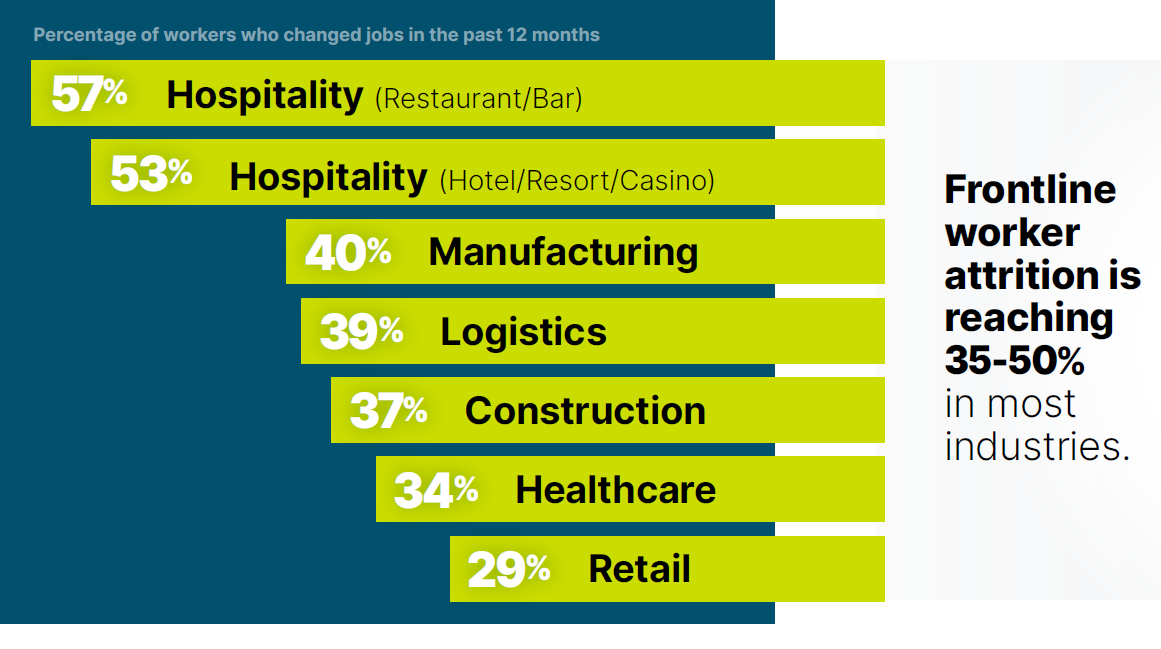Beekeeper: 4 in 10 frontline workers have quit in the last year
The figure jumps to over 50% in hospitality, and managers still don’t understand the main causes – here’s how tech could help.
News In Brief
Frontline employees are still quitting in droves - and managers and head office staff don't know how to fix it.
Here are some solutions from Beekeeper's latest frontline report.
Plus check out exclusive insights from the frontline tech giant's CEO and co-founder Cris Grossman.
The pandemic may be over, but sky high attrition continues to plague frontline employers – and this is impacting their bottom lines.
New global research by Beekeeper found that 41% of frontline workers have changed jobs in the past year – this rises to more than half for hospitality workers in bars, restaurants and hotels.

Credit: Beekeeper’s Frontline Workforce Pulse Report 2024.
Managers are also feeling the pinch – 38% of the 2,300 frontline managers surveyed by Beekeeper (5,600 frontline employees were part of the research).
The top reason why employees are voting with their feet and continuing to quit their jobs is that pay is not keeping with record-high inflation rates across the world.
48% of workers, and 36% of managers, told Beekeeper that wages were falling behind inflation.
This was the number one source of stress for employees, especially in the construction and logistics sectors.
The other stressors workers are facing are linked with retention – because so many people have left, they are now facing higher workloads, and having to train new employees who may not stay long-term.
This is impacting their work-life balance, and their wider wellbeing.
In fact, understaffed shifts was the number one factor impacting employee productivity (36%) – number two was lack of recognition (26%) and third was poor cross-team communications (18%).
Solving the frontline employee-manager disconnect
The issue is that managers and head office staff (of which 200 were surveyed by Beekeeper) are overlooking employee challenges here.
They thought that low morale (52%), unclear goals (41%) and a lack of training (36%) were the main productivity issues.
Only 29% noted the impact of understaffed shifts on employee productivity – this dropped to 19% for lack of recognition.
Speaking exclusively to UNLEASH, Beekeeper co-founder and CEO Cris Grossman shares: “From pharmacy staff to autoworkers, the needs of frontline workers aren’t being met and they’re making their concerns known in the form of strikes, labor movements, job-hopping and more.
And it’s interesting to see in the report how frontline worker needs are not only unmet, but management doesn’t know what those needs are in the first place.”
Clearly something needs to change if frontline employers are going to finally nip attrition and unproductivity in the bud.
Yes, pay is one part of the puzzle, but here’s what more HR leaders and organizations can do to re-engage frontline employees and reap the business rewards.
Beekeeper’s report calls on organizations to step up and really listen to their employees’ woes, and then take appropriate action around pay, work-life balance and recognition.
Another piece of the puzzle is to embrace frontline-first technology that makes their working lives easier.
These tools need to be mobile-first, and fit seamlessly into their working processes – for instance, technologies that enable them to choose and swap shifts in real-time.
Communications needs to be more seamless, and more friendly.
Workers across all sectors and geographies told Beekeeper that they wanted to work in a friendly and fun environment, not a toxic one dominated by stress and constant turnover.
Sign up to the UNLEASH Newsletter
Get the Editor’s picks of the week delivered straight to your inbox!

Chief Reporter, UNLEASH
Allie is an award-winning business journalist and can be reached at alexandra@unleash.ai.
Contact Us
"*" indicates required fields
Partner with UNLEASH
"*" indicates required fields